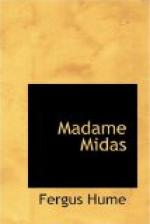And without a single thought for the woman whose confidence he was betraying, and of whose bread and salt he had partaken, Vandeloup shook the reins, and the horse started down the road in the direction of Ballarat, carrying Madame Midas and her nugget.
‘You carry Caesar and his fortunes, M. Vandeloup,’ she said, with a smile.
‘I do better,’ he answered, gaily, ’I carry Madame Midas and her luck.’
CHAPTER IX
LOVE’S YOUNG DREAM
Mr Mark Marchurst was a very peculiar man. Brought up in the Presbyterian religion, he had early displayed his peculiarity by differing from the elders of the church he belonged to regarding their doctrine of eternal punishment. They, holding fast to the teachings of Knox and Calvin, looked upon him in horror for daring to have an opinion of his own; and as he refused to repent and have blind belief in the teachings of those grim divines, he was turned out of the bosom of the church. Drifting to the opposite extreme, he became a convert to Catholicism; but, after a trial of that ancient faith, found it would not suit him, so once more took up a neutral position. Therefore, as he did not find either religion perfectly in accordance with his own views, he took the law into his own hands and constructed one which was a queer jumble of Presbyterianism, Catholicism, and Buddhism, of which last religion he was a great admirer. As anyone with strong views and a clever tongue will find followers, Mr Marchurst soon gathered a number of people around him who professed a blind belief in the extraordinary doctrines he promulgated. Having thus founded a sect he got sufficient money out of them to build a temple—for so he called the barn-like edifice he erected—and christened this new society which he had called into existence ‘The Elect’. About one hundred people were members of his church, and with their subscriptions, and also having a little money of his own, he managed to live in a quiet manner in a cottage on the Black Hill near to his temple. Every Sunday he held forth morning and evening, expounding his views to his sparse congregation, and was looked upon by them as a kind of prophet. As a matter of fact, the man had that peculiar power of fascination which seems to be inseparable from the prophetic character, and it was his intense enthusiasm and eloquent tongue that cast a spell over the simple-minded people who believed in him. But his doctrines were too shallow and unsatisfactory ever to take root, and it could be easily seen that when Marchurst died ‘The Elect’ would die also,—that is, as a sect, for it was not pervaded by that intense religious fervour which is the life and soul of a new doctrine. The fundamental principles of his religion were extremely simple; he saved his friends and damned his enemies, for so he styled those who were not of the same mind as himself. If you were a member of ‘The Elect’, Mr Marchurst assured you that the Golden Gate was wide open for you, whereas if you belonged to any other denomination you were lost for ever; so according to this liberal belief, the hundred people who formed his congregation would all go straight to Heaven, and all the rest of mankind would go to the devil.




